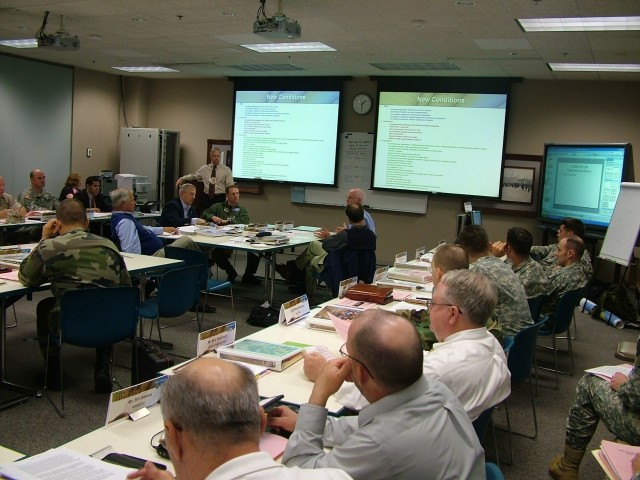
CARLISLE BARRACKS, Pa. (Army News Service, May 7, 2008) - The Nigerian government is near collapse and rival factions are vying for power in that troubled part of the world, or at least a visitor to the Army War College this week would think that to be the case.
The War College is hosting Unified Quest 08 which includes military leaders old and new from around the world as well as representatives from academia, industry and several different government agencies to discuss responses to global conflicts of the future.
The fictitious Nigerian scenario, set in 2013, is one of four such imaginary conflicts being played out.
Unified Quest 08 is an Army war game -- co-sponsored by the Army Training and Doctrine Command, Joint Forces Command and Special Operations Command -- that looks at what the world might be like in five to 25 years and looks at how best to respond to crises that might become a reality. The Army has been doing Unified Quest annually since 2003.
Using these games, Army leaders hope to understand the Army's role in responding to conflicts around the globe, said Maj. Gen. Barbara Fast, deputy director of the Army Capabilities Integration Center.
The exercise centers around realistic threats to ongoing peace around the world, like the potentially negative effects of globalization, competition for energy, demographic trends, climate change and natural disasters, proliferation of weapons of mass destruction and the existence of failed or failing states that could be havens for terrorists.
One of the main ideas of the game is the concept of "building partnership capacity" and understanding how the Army can better coordinate with other U.S. agencies and departments when responding to these unique future conflicts throughout the world, Fast said.
"Much of what we're talking about, more than ever, requires a whole of government approach," Fast said.
She said that the most important take-away from Unified Quest exercises in the past has been that the Army can't solve every problem alone. It needs to work in concert with different agencies, departments and foreign entities to deal with all facets of future conflicts.
Because of the understanding of a need for a unified government approach to conflicts around the globe, each year more and more government representatives from outside the Army, like the U.S. Agency for International Development and the State Department, have been coming to Unified Quest, said Lt. Col. John Miller, deputy chief of future warfare at ARCIC. This is so that participants can learn to look at conflicts together and understand how to better coordinate and solve problems before fighting begins, he said.
"If we have to put troops on the ground, something has failed," Miller said.
Participants looked at four future scenarios from around the world. Three were set in 2013, one in Peru, one in the Philippines and the Nigerian one. There was also a scenario set in 2025 in Somalia.
For each scenario, a blue team, red team and green team played out the conflict. The blue team represented the United States and its allies. The red team represented the enemy, whether it was a terrorist organization or a rival tribe vying to overthrow the government. The green team acted as the populace and represented their opinions and reactions to ongoing operations so they could be taken into account.
While the four specific scenarios played out, one panel of experts also looked at larger issues facing the Army as a whole.
Panelists there candidly discussed what they each saw as issues facing the Army. For example, one discussion focused on a perceived lack of true cultural awareness among the ranks and a lack of bilingual officers. They also talked about potential solutions, like perhaps putting more emphasis on language skills when considering officer promotions.
The recommendations and lessons learned from Unified Quest will be crystallized and given directly to Army Chief of Staff Gen. George Casey as well as other Army leaders for their consideration as they plan for the Army's future, Fast said.

Social Sharing